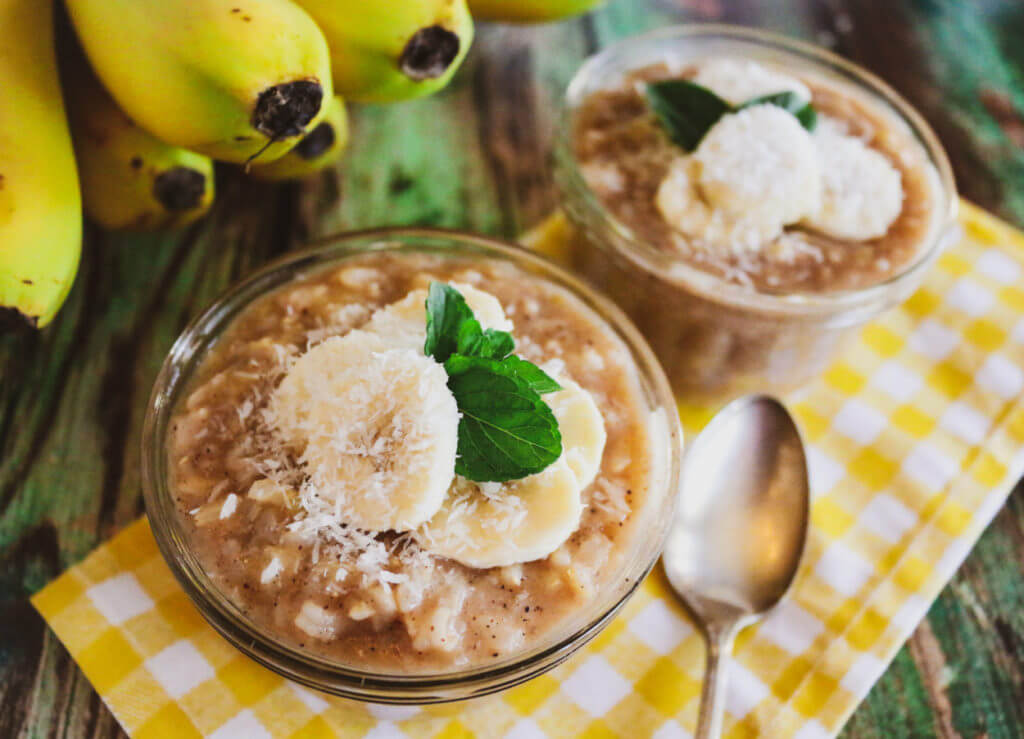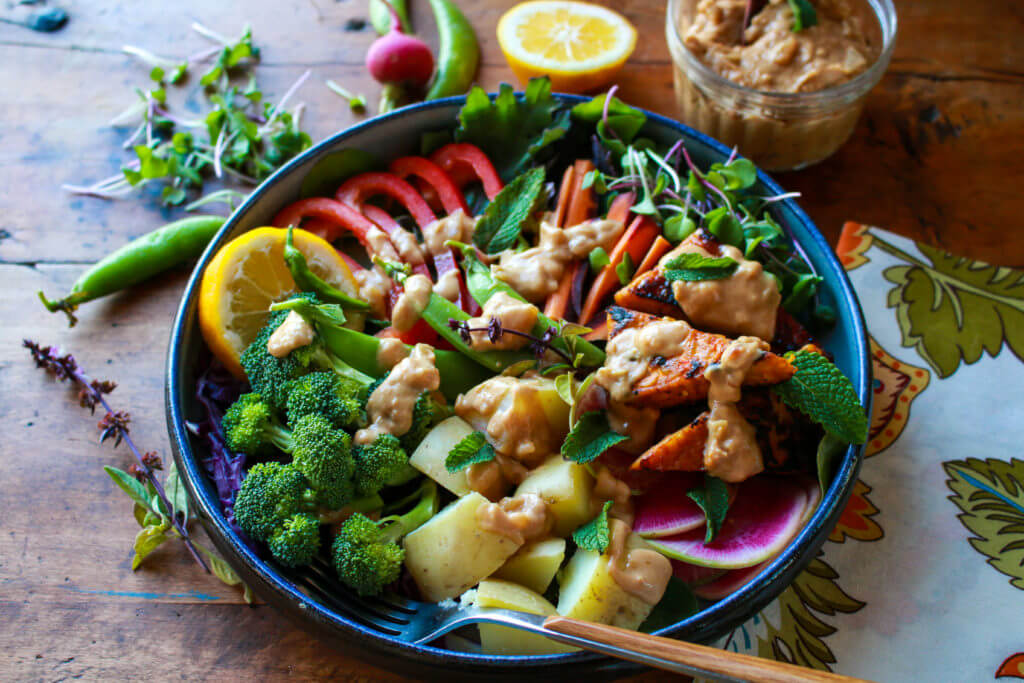Whole Food Plant-based Diet Choline
How to Get Choline on a Vegan and Vegetarian Diet


Choline may not be on your radar, but it should be. This essential nutrient has been highlighted recently because Americans aren't getting enough of it. According to a recent study, only about 11% meet their daily needs, and 65% don't even know what it is! Yet, this nutrient is critical for your health, particularly in maintaining a healthy liver system and brain. While everyone needs choline, it seems to be even more important early in life while the brain is developing, and later in life to prevent cognitive decline. That's why the FDA recently established a RDI (Reference Dietary Intake) of 550 milligrams (mg) for choline for adults and children 4 and above, and a Daily Value (DV, the daily requirement abased on 2,000 calories per day), which you will soon see listed on the Nutrition Facts labels of foods—indicating what percentage of the Daily Value a portion of food provides.
Here are the Adequate Intakes established for choline.
Adequate Intakes for Choline
| Age | Male | Female | Pregnancy | Lactation |
|---|---|---|---|---|
| Birth to 6 months | 125 mg/day | 125 mg/day | ||
| 7–12 months | 150 mg/day | 150 mg/day | ||
| 1–3 years | 200 mg/day | 200 mg/day | ||
| 4–8 years | 250 mg/day | 250 mg/day | ||
| 9–13 years | 375 mg/day | 375 mg/day | ||
| 14–18 years | 550 mg/day | 400 mg/day | 450 mg/day | 550 mg/day |
| 19+ years | 550 mg/day | 425 mg/day | 450 mg/day | 550 mg/day |
Institute of Medicine. Food and Nutrition Board. Dietary Reference Intakes: Thiamin, Riboflavin, Niacin, Vitamin B6, Folate, Vitamin B12, Pantothenic Acid, Biotin, and Choline. Washington, DC: National Academy Press; 1998.

So, where can you get choline in your diet? The top sources include beef liver, eggs, beef, scallops, salmon, chicken, and cod. But where are you going to get choline if you're a vegetarian or vegan? Vegetarians can get some choline in eggs and milk products. And there are several plant-based sources of choline (see chart below), including legumes, tofu, green vegetables, potatoes, nuts, seeds, grains, and fruit—all of which contain some amounts of choline. However, plant sources are fairly low in choline, making it even more difficult to reach that RDI of 550 mg/day if you're vegan. Keep in mind that the average intake for choline in the U.S. is 402 mg in men and 278 mg in women.

We don't have a great deal of data on choline intakes among plant-based eaters. But here's a sample menu for a vegetarian eating pattern providing 2000 calories per day:
- Breakfast: Avocado Toast with Hard Boiled Egg
- AM Snack: Apple & Cheddar Cheese Stick
- Lunch: Loaded Sweet Potato with Brown Rice, Black Beans, Guacamole, Cotija Cheese & Sour Cream
- PM Snack: Non-Fat Latte and Dried Dates
- Dinner: Asian Tempeh Bowl
The estimated daily choline intake of this sample menu is 187 mg (37% DV).
However, keep in mind that I analyzed my version of a recommended healthy, well-planned vegan diet, as follows:
Breakfast
1 cup oats
1 banana
2 tablespoons wheat germ
2 tablespoons flax seeds
8 ounces soy milk
Lunch
Salad:
3 ounces extra firm tofu
2 cups kale
1/4 cup almonds
1/2 cup broccoli florets
1/2 cup cherry tomatoes
2 tablespoons tahini
1 slice whole grain bread + 1/2 avocado
Dinner
1 cup chickpeas
1 cup masala sauce
1 cup cooked quinoa
1 cup cooked brussels sprouts
1 apple
The estimated choline intake from this vegan menu (2452 calories) is 255 mg choline.

So, what should you do? First off, my recommendation for all vegans and vegetarians is to eat a diet rich in whole, minimally processed plant foods, including portions from all the major food groups at each meal: pulses (beans, lentils, peas) or soyfoods, nuts or seeds, whole grains, fruits, and vegetables (green vegetables daily). This will help supply a source of important essential vitamins and minerals to your diet, including calcium, iron, zinc, and choline. If you aim for a diet filled with whole plant foods, you may come pretty close to meeting your choline needs, as evidenced in my sample meal plan. Adult women should aim for 425 mg per day, and men for 550 mg per day.

My second recommendation for plant-based eaters (particularly for vegans) is to supplement smartly. It is important to supplement a few key nutrients. One is vitamin B12, which is found primarily in animal foods. In addition, I recommend that you consume fortified sources of calcium and vitamin D (for example, in plant-based milk) and evaluate whether you need to take an additional supplement to meet your needs. Other nutrients that may be worth supplementing include long chain omega-3s (algae DHA and EPA) and iodine. And, considering the recent news on choline, it seems that you might want to take a closer look at this nutrient in your diet.
If you eat a diet filled with whole plant foods, you may come pretty close to meeting your needs. However, if your intake is lower than 2000 calories per day for women, or 3000 calories per day for men, you may fall short of choline. So, you may want to supplement your diet a few times per week with choline. However, keep in mind that new research has linked high choline intake and blood levels with increased mortality. That's because high choline intake has been linked with increased production of TMAO, which has been associated with significantly higher risk of heart attacks and strokes compared with lower levels. So, it may not be a good ideas to over supplement with choline. As with all dietary supplements, you should discuss them with your health care professional before taking them. It may be beneficial to take small doses of choline (about 250 mg) a few times per week to balance out low intake, but it's not a case of more is better! Here is a really good article on this topic of choline intake and heart risks written by one of my colleagues, Carrie Dennett.

I prefer to approach supplementation from the perspective that you should supplement your diet with the nutrients you fall short on, not the whole kitchen sink in one pill. For example, plant-based eaters typically get higher levels of vitamins E, A and C, thiamin, riboflavin, and folate than omnivores. So, why supplement all of these nutrients, which may come along for the ride in a multi? And multivitamins may not contain those nutrients you are looking for, such as calcium and choline. A supplement should be just that—a supplement to your diet, covering the shortfall. You may need to only take half the recommended level to meet your diet half way. And remember that overdoing supplements is never a good thing. I recommend sticking as close to the recommended daily level as possible, factoring in that you gain some of these nutrients in your diet, too.
Please note that it is important to discuss any dietary supplement regimen with your healthcare practitioner. In addition, you should discuss your own personalized diet plan and nutrient needs with a trained, plant-based health care practitioner, such as a registered dietitian or physician knowledgable in this area.

Vegan and Vegetarian Food Sources of Choline
The following plant foods offer sources of choline.
| Vegan | Serving | Choline (mg) |
| Almonds, dry roasted | 1 ounce | 7 |
| Apples, raw, with skin | 1 large | 8 |
| Bananas, raw | 1 medium | 12 |
| Bread, whole wheat | 1 slice | 15 |
| Broccoli, cooked | 1 cup, chopped | 63 |
| Brussels sprouts, cooked | 1 cup | 63 |
| Brown rice, cooked | 1 cup | 18 |
| Chickpeas, cooked | 1 cup | 70 |
| Dates, medjool | 1 | 10 |
| Flaxseed, ground | 2 tablespoons | 11 |
| Lentils, cooked | 1 cup | 65 |
| Oats, instant, fortified, plain | 1 cup | 17 |
| Oranges, raw | 1 large | 16 |
| Peanut butter, smooth | 2 tablespoons | 20 |
| Peanuts | 1 ounce | 15 |
| Potatoes, boiled, in skin | ½ cup | 11 |
| Quinoa, uncooked | ¼ cup | 30 |
| Soymilk, original and vanilla, unfortified | 1 cup | 57 |
| Sunflower seeds, dried | 1 ounce | 15 |
| Spaghetti, cooked, enriched | 1 cup | 13 |
| Squash, summer, cooked | 1 cup | 9 |
| Tofu, firm | ½ cup | 35 |
| Tomato sauce | 1 cup | 15 |
| Wheat germ, toasted | 2 tablespoons | 25 |
| Vegetarian | ||
| Egg | 1 large | 147 |
| Milk, skim | 1 cup | 38 |
| Yogurt, low-fat, plain | 1 cup | 37 |
Source: USDA

Image: This Harvest Grain Bowl, which is rich in choline, is featured in my new book California Vegan, coming out in 2021.
Written by Sharon Palmer, MSFS, RDN on January 30, 2017; updated on August 6, 2020.
Check out one of my favorite online purveyors of healthful, plant-based, sustainable organic foods and products, Thrive Market. Get 25% off today by grabbing this discount code today! Note: This is an affiliate program I'm partnering with.

Whole Food Plant-based Diet Choline
Source: https://sharonpalmer.com/getting-choline-on-a-vegetarian-or-vegan-diet/